| Participants asserted that achieving net zero emissions—the crux of the three-day conference—can be accomplished if all stakeholders are robustly engaged |
| BALACLAVA, Mauritius, December 12, 2022/ — The 17th African Economic Conference ended on Sunday with a charge to the development community and governments to take decisive actions to address climate change.
The African Development Bank, United Nations Economic Community for Africa, and United Nations Development Programme, the conference hosts, called on participants to walk the talk by producing concrete solutions for climate-smart development on the continent. Participants asserted that achieving net zero emissions—the crux of the three-day conference—can be accomplished if all stakeholders are robustly engaged, including providing the right environment for public-private partnerships. “Africa is the region that is most vulnerable in the face of climate change,” said Mauritius’ Minister of Finance, Economic Planning and Development, Renganaden Padayachy. The scourge of climate change poses a threat to lives, he cautioned. “And if we limit climate change, we will change lives,” he said at the closing of the three-day conference, which had an in-person attendance of over 350 delegates, with thousands more participating online. AEC 2022 provided a timely forum to discuss innovative solutions to support climate-smart development in Africa. African Development Bank Acting Chief Economist and Vice President for Economic Governance and Knowledge Management, Prof. Kevin Urama, stressed that Africa’s future will come from the innovation of young Africans. Speaking directly to Africa’s youth, Urama said: “Your innovation, your knowledge, your power, use that so that we can do climate-smart development on the continent.” He noted that the conference produced rich lessons, including challenges, solutions, and what the private sector and government can do to leverage available skills and technology. In a speech on her behalf, UNDP Assistant Administrator and Director of the Regional Bureau for Africa, Ahunna Eziakonwa, called for accelerated action. “We must be particularly mindful of the economic, societal, environmental, political, and security costs of green transitions. We must fully understand the trade-offs and opportunity costs on communities and families and avoid pathways that undermine development prospects and deepen inequalities,” Eziakonwa said. She observed that climate finance is urgent and urged African governments to resolve the uncertainty around it. “Reaching net zero emissions must also mean reaching zero poverty,” Eziakonwa reiterated. Deputy Executive Secretary and Chief Economist of the United Nations Economic Commission for Africa (ECA), Dr. Hanan Morsy, observed that addressing climate change should not be a choice but an imperative for Africa to achieve climate-smart development. “As such, what we have developed and discussed here regarding climate-smart development is not just an event. This is a process,” she said and urged African countries to heed the analyses and recommendations presented at the conference. The conference, held in Balaclava, Mauritius, brought together policymakers, climate experts, representatives of the private sector, academics and youth to develop an action plan to guide Africa as it navigates the threat of climate change. AEC2022 was jointly organized by the African Development Bank, United Nations Economic Commission for Africa, and the United Nations Development Programme, in collaboration with the government of Mauritius. This year’s conference had the theme Supporting Climate-smart Development in Africa. Distributed by APO Group on behalf of African Development Bank Group (AfDB) |
Category: ECONOMY
-
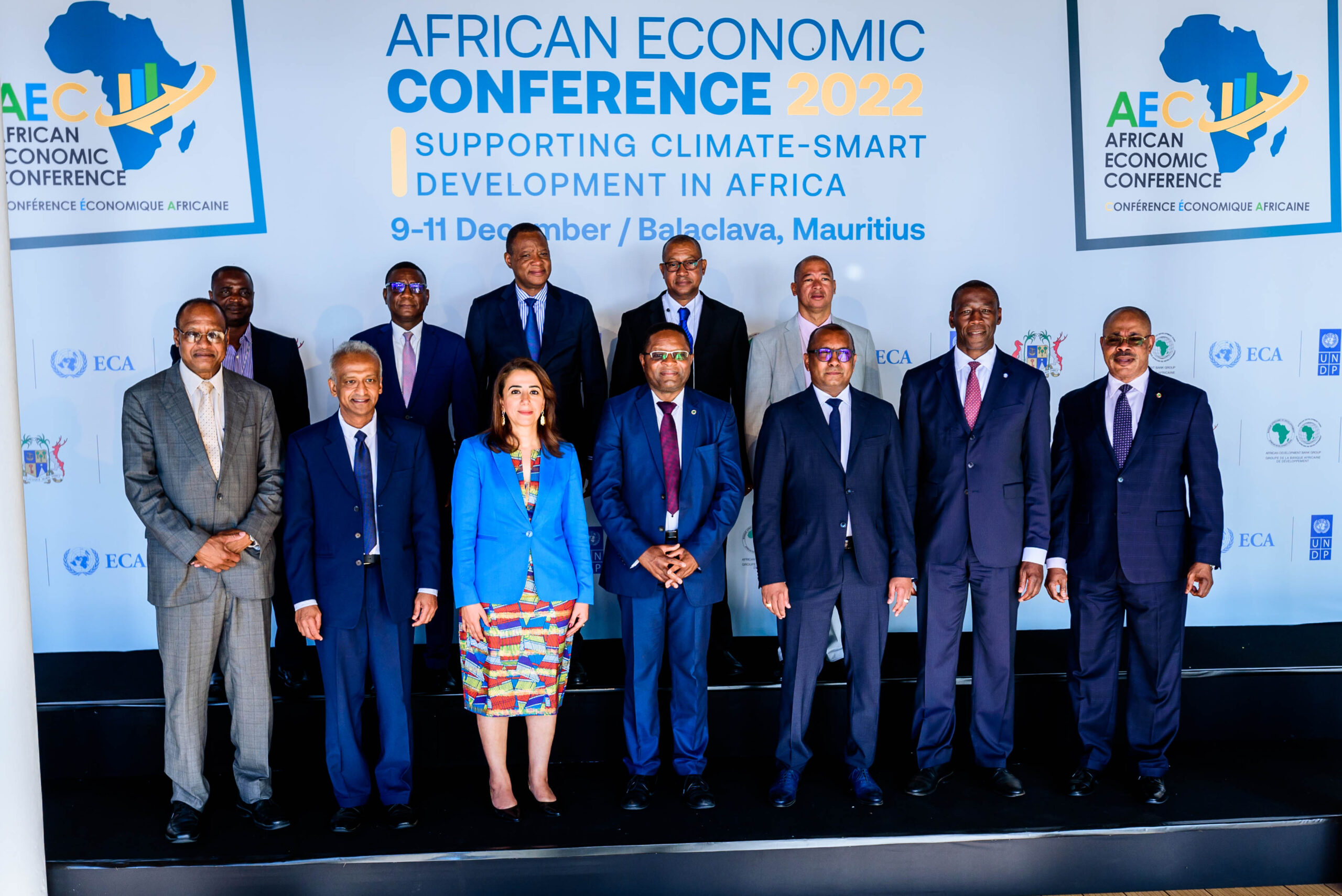
African Economic Conference 2022 urges development community to “walk the talk” on innovative solutions to fight climate change
-
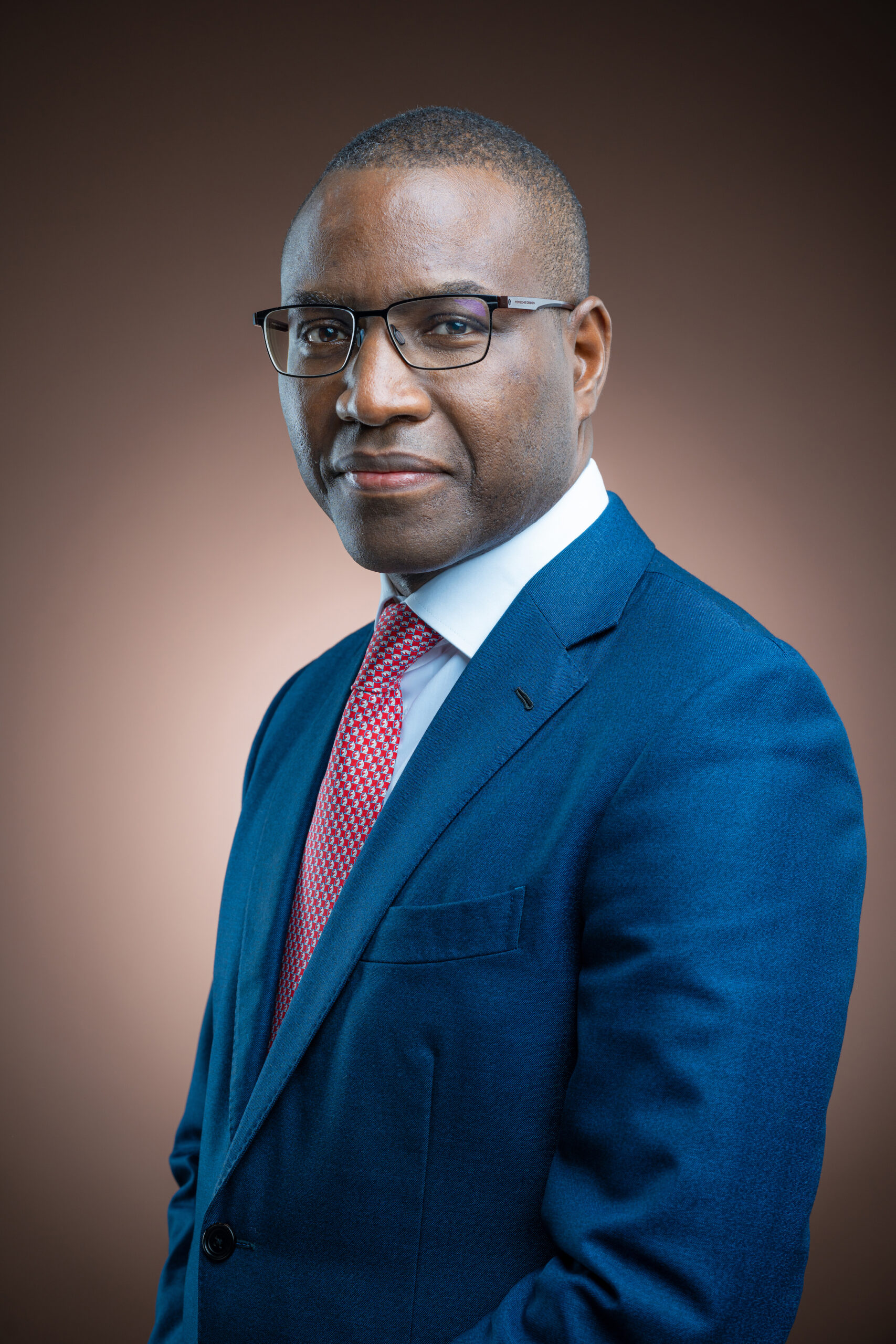
African Development Bank Group President appoints Senegal’s former Minister Amadou Hott as Special Envoy for the Alliance for Green Infrastructure in Africa
The Alliance will mobilize up to $500 million needed for a robust pipeline of bankable, greener projects ABIDJAN, Ivory Coast, December 13, 2022/ — African Development Bank Group (http://www.AfDB.org) President Dr. Akinwumi Adesina has appointed Senegal’s former minister Amadou Hott, as his Special Envoy and global champion for the Alliance for Green Infrastructure in Africa (AGIA). The African Development Bank, Africa Union and Africa50 launched the Alliance during COP27 last November with global partners: the African Union Development Agency, the African Sovereign Investors Forum, the European Investment Bank, the European Bank for Reconstruction and Development, the French Development Agency, the Rockefeller Foundation, the US Trade and Development Agency, the Global Center on Adaptation and the Private Infrastructure Development Group.
The Alliance will accelerate Africa’s transition to Net Zero by mobilizing, at scale and speed, investments needed to bridge the infrastructure gap for the continent’s low-carbon and climate-resilient development.
The Alliance will mobilize up to $500 million needed for a robust pipeline of bankable, greener projects. This is projected to generate up to $10 billion in investment opportunities from a combination of co-investments, co-financing, risk mitigation and blended finance.
Mr. Hott brings a wealth of experience in resource mobilization, public-private-partnerships, sustainable energy and infrastructure finance, and investment banking. He has strong relationships with African policymakers, development partners, strategic and institutional investors to mobilize significant capital for green infrastructure project development and financing in Africa.
Mr. Hott was until last September, Senegal’s minister for Economy, Planning and Cooperation. During his tenure, the country implemented landmark economic reforms, including the Economic and Social Resilience Plan and the reform of public-private partnerships.
Before joining government, Mr. Hott was African Development Bank Group’s Vice President for Power, Energy, Green Growth and Climate Change. During his tenure, the Bank Group significantly increased investments in renewable energy. In 2017, he helped the Bank Group allocate 100% of its power generation investments in renewable energies. Prior to joining the Bank Group, Mr. Hott served in structured finance, sovereign wealth fund management, and the development of integrated energy solutions in various major markets including New York, London, Dubai, and Lagos.
Amadou Hott holds an Associate degree in Applied Mathematics from Louis Pasteur University in Strasbourg, France, a bachelor’s degree in Economics, and a master’s degree in Financial Markets and Banking Management from Sorbonne University, Paris. In 2012, the World Economic Forum nominated him as a Young Global Leader.
Commenting on his appointment, Mr. Hott said: “I am honored to champion this great initiative under President Adesina’s visionary and impactful leadership. The Alliance will support Africa’s transition to Net Zero emissions. We need to frontload investments in infrastructure for Africa to meet the Sustainable Development Goals by 2030 and to develop the continent. I look forward to working with all regional and global stakeholders and partners to succeed in this new challenge.”
Dr. Adesina said: “I am delighted to have former Minister Amadou Hott as my Special Envoy to globally champion the Alliance and help mobilize significant resources and stakeholders for more green investments in Africa. He has a strong track record of mobilizing resources and multi-stakeholder engagement for key initiatives, particularly in green infrastructure.”
Distributed by APO Group on behalf of African Development Bank Group (AfDB).
Contact:
Chawki Chahed
Communication and External Relations Department
media@afdb.org -

Positive Foreign Spillover Effects Needed in Africa’s SEZs Operations:EDITORIAL COMMENT
Africa’s decades long trailing behind the rest of the world in terms of industrialization is a thorny issue that has attracted comments from various development economists and experts.
In order to scale up industrialization efforts, they contend, Africa needs a well crafted and strategic 21st Century industrial policy. Increased investments in logistics, transportation and infrastructure which are non-negotiable they contend, must underpin the industrial policies of the various African countries.
On Special Economic Zones(SEZs) even though they admit can contribute to Africa’s economic development, but they are quick to caution, that foreign companies with investments in the Zones should have a positive spill-over effect on local companies through supply value chain linkages.
This, in their opinion, could help local companies to benefit from technology transfer, capacity building and for that matter, their growth needed to positively impact local economic development. The foreign and local joint ventures paradigm they highly recommend ought to be pursued seriously with reasonable support from the public sector.
Foreign Direct Investment(FDI) they argue, should be properly linked to the local companies and for that matter, the economies of the host African countries. Through this way, local African economies could benefit from the positive impact of the operations of foreign companies for shared gains and prosperity.
Without win-win approaches, they caution, African countries could be faced with the situation whereby incoming foreign companies continue to maximize gains and prosperity from their operations to the disadvantage of the gross national economies of the host countries..
Such a situation in their opinion, wouldn’t engender the much expected contribution of FDI to the growth and development of the economies African countries. More foreign direct inflows into African countries without proper linkages to their local economies, expert views say, wouldn’t necessarily lead to economic development.
Promoting and supporting domestic investments ought to be equally taken seriously within Africa’s 21st Century industrial development policy frameworks they also advocate.
That Africa has for decades been missing out in terms of heavy machinery and other industrial goods manufacturing and only confined mainly to raw material exports, is no understatement .The experts contend, Africa’s attention shouldn’t be too much focused on catching up with the rest of world in this area as the odds are not in favour of Africa in thus turbulent world.
Within Africa’s 21st Century industrial policy frameworks they recommend the continent must rather pay special attention to industry without smokestack as an area to employ for scaling up the continent’s industrialization ambitions. A well balanced and integrated heavy smoke manufacturing and industry without smokestack ,approach, is also recommended.
They recommend more involvement of local companies, in light industrial manufacturing through the SEZs and where foreign companies are also much involved . They also recommend Africa could also take due advantage of her competitive edge in agriculture/agribusiness, horticulture, and natural resources extraction in which Africa abounds. They are however quick to emphasize prudent, ecofriendly and sustainable natural resources exploitation in African countries and ensuring they don’t get trapped in the so-called resource curse.
In as much as we of the Ecoenvironews Africa magazine, wish to commend the AUC and all Free Zone Operators on the continent, we also would like to crave your indulgence to all times, be circumspect about points being raised by various development economists in Africa and around the globe.
Ecoenvironews Africa do take special note of the various insightful lectures on Africa’s industrialization and the underlying challenges by Prof John Page, Non-resident Senior Fellow – Global Economy and Development ,Africa Growth Initiative.
Africa’s most youthful continent status underpinned by an ever increasing high rate of youth unemployment should be a cause for concern to all and Africa must go all out to all use all available weapons to remedy the situation.
The Africa Continental Free Trade Area Agreement (AfCFTA) is a weapon Africa must hold on firmly and use it to the maximum advantage of the continent towards changing the narrative. Africa as continent has been abundantly favoured by nature and its people deserve.
Africa cannot afford to again underutilize this golden opportunity and for whatever reasons.
-

Unveiling SEZs role in Africa’s Industrialization
USD2.6 billion Invested,60 million Jobs Created
…. As AU-AEZO Symposium ends in Abuja
Story: Mohammed Abu
The 5th African Union Commission(AUC)Symposium on Special Economic Zones(SEZs) and the 7th Annual Meeting of Africa Economic Zones Organization(AEZO) ended recently in the Nigerian capital of Abuja with an expression of interest by President Bukhari to collaborate with SEZs in Africa to benefit from the AfCfTA.
The Nigerian President also commended the AFZO for bringing Free Zone Operators in Africa together through the event which was held under the theme, “African Special Economic Zones: Engine for Resilience and Acceleration for Sustainable Industrial Development”
In his opening statement, secretary general of AEZO Ahmed Bennis, hailed the development of SEZs on the continent as drivers of economic development.
“Over the past five years, 60 million jobs have been created in agro-processing, industrial fields, and services and more than $2.6 billion has been invested in the development of SEZ projects in the continent,” he said.
In a recorded statement for the event, the president of the African Development Bank Group, Dr. Akinwumi Adesina, argued SEZ can help change that. “The role of SEZs is to accelerate sustainable industrial value chain development,” he said.
-
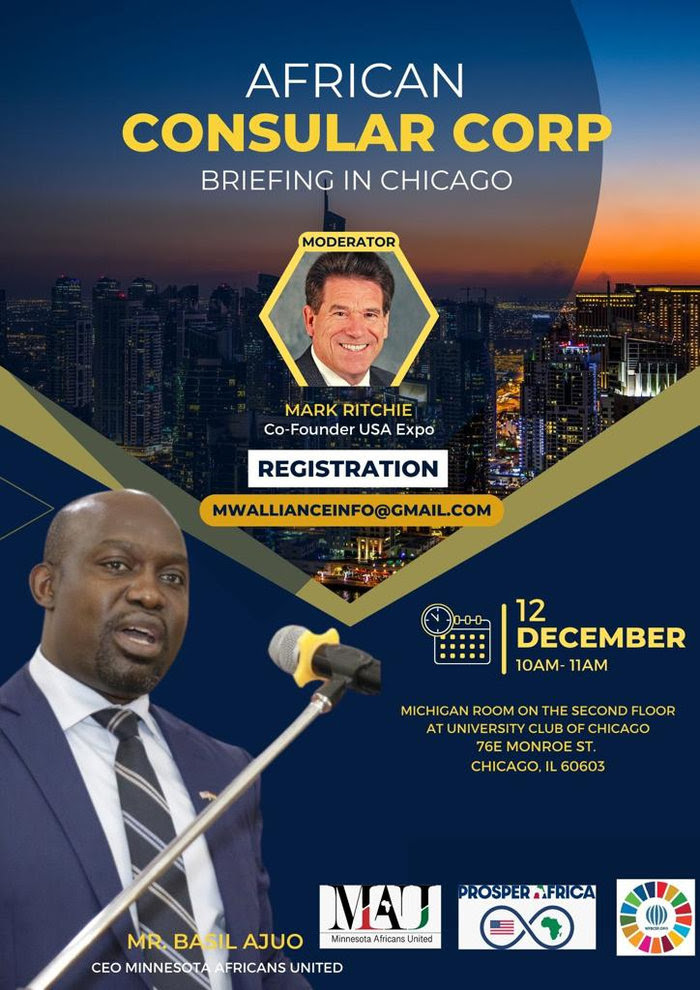
Gearing up for U.S.-Africa Leaders Summit
MAU Leads the charge in getting bid for Minnesota
………As Consular Corp briefing due in Chicago on Monday
By: Mohammed Abu
Minnesota Africans United will host a briefing for Chicago-based Consul Generals and Honorary Consuls on Monday, December 12th at the University Club in Chicago.
This will be an open meeting, with formal invitations to the Consular Corp and to other key leaders, according to an official MAU announcement.
Minnesota Africans United (MAU), the civil society organization representing Diaspora communities from the entire continent, has been crucial to the success of this bid.
MAU has built very good support for Minnesota’s bid by building strong, long-lasting relationships with African leaders through trade missions, webinars, conferences, hosting visiting delegations, and with direct lobbying of Foreign Ministers and Ambassadors, Cabinet Members, and Heads of State.
This briefing will be led by Basil Ajuo, President and CEO of Minnesota Africans United. At this briefing he will report on MAU recent delegations to lobby key decision-makers specifically, and he will discuss how Expo 2027 will benefit the African communities in Chicago.
Joining MAU President Ajuo for this briefing, will be Mark Ritchie, founder Minnesota USA Expo and co-author of the Minnesota’s official bid, entitled “Wellness and Wellbeing for All: Healthy People, Healthy Planet.” He will discuss the important role that Chicago has played over the last decade in this process, and how we can maximize potential benefits for our region.
Minnesota Africans United Minnesota’s bid to host the 2027 World’s Fair is in the final stage, with strong backing from all branches of the Federal Government and from public and private sector leaders throughout the nation.
Chicago has a central role in Expo 2027 – as the host city of nearly all Consulates covering our region, the location of many of our nation’s leading medical and health organizations and corporations, and as a major travel/ tourism hub.
Visitors and participants in Expo 2027 and related activities will travel around the U.S. and across the entire planet – often stopping by Chicago along the way. Heads of State will visit, as will many other key leaders.
The briefing is to provide important background information and an up-to-date assessment of where things stand going into President Biden’s Africa-U.S. Summit.
For more information, please contact Deanna Nord, founder and president of the Chicago-based Midwest Alliance of Health Innovations and Impact.
The Alliance has been one of the key supporters of Minnesota’s Expo bid, working to bring attention to the potential economic benefits for our entire region.
-
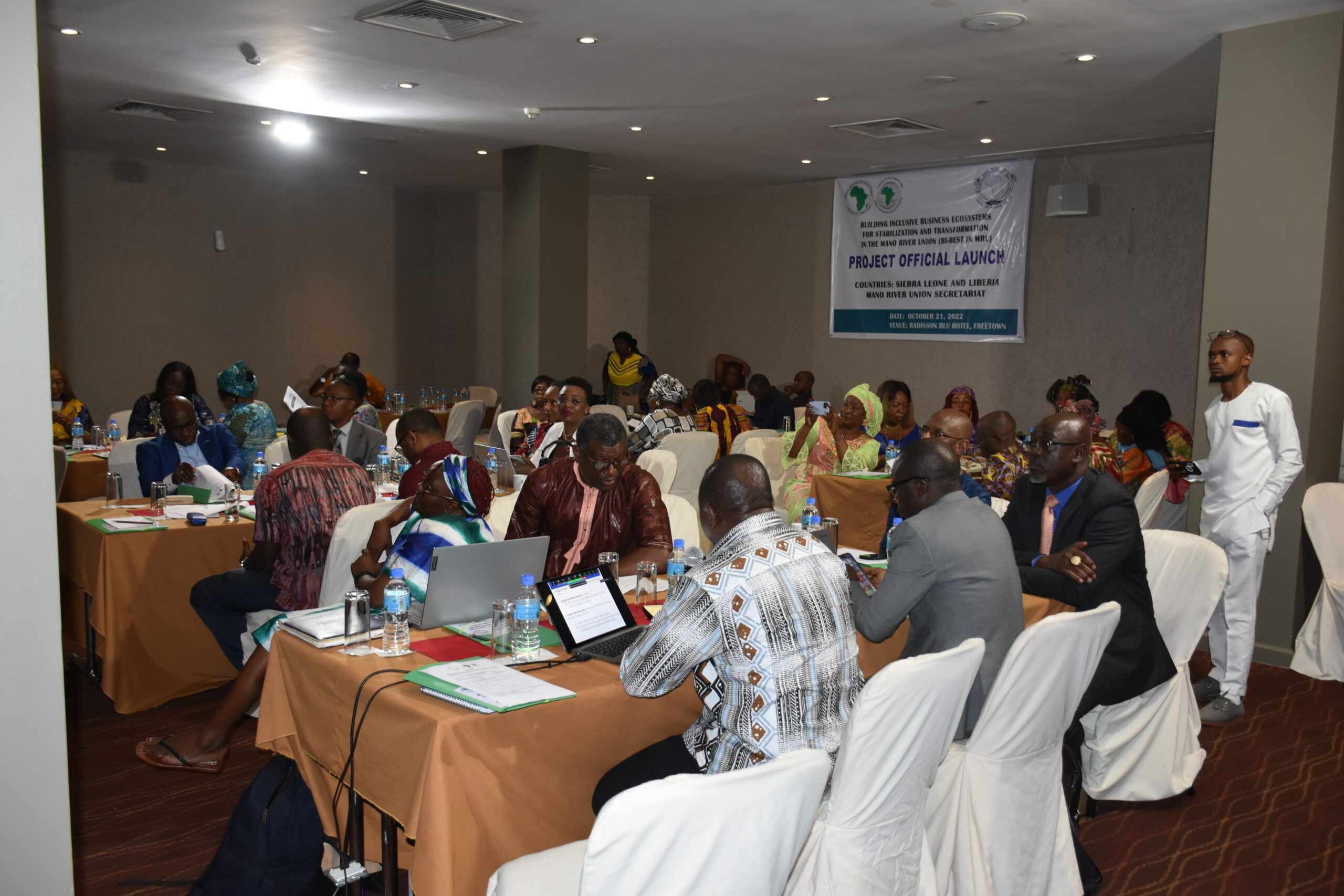
Mano River Union launches scheme to build inclusive business ecosystems
OPINION PIECE By Charleine MBUYI LUSAMBA & Hoda Tarek) Sierra Leone’s Minister of Gender and Children’s Affairs, Manty Tarawalli, commended the African Development Bank for what she said was a “well-thought” initiative to support women’s economic empowerment ABIDJAN, Ivory Coast, December 7, 2022/ — By Charleine MBUYI LUSAMBA, Task Manager & Hoda Tarek, Gender and Development Expert On 21 October 2022, the African Development Bank and the Mano River Union Secretariat hosted an event to launch the Project to Build Inclusive Business Ecosystems for Stabilization and Transformation in the Mano River Union (BI-BEST) in Freetown, Sierra Leone.
Launching the $4.25 million project, Sierra Leone’s Minister of Gender and Children’s Affairs, Manty Tarawalli, commended the African Development Bank for what she said was a “well-thought” initiative to support women’s economic empowerment.
She said the project would empower women cross-border traders and foster economic development and regional integration within the Mano River Union.
Minister Tarawalli noted that the project was timely as it would help Liberia and Sierra Leone in their efforts to mitigate the impact of the current global economic challenges on their people.
Isata Kamara, Deputy Minister of Trade and Industry of Sierra Leone and a representative of the Ministry of Gender and Social Protection of Liberia, attended the event. Other participants included representatives of development partners, joint border security units, the Mano River Women’s Peace Network and women cross-border traders.
BI-BEST is expected to positively impact nearly 1500 women traders at two borders points — Koindu-Foya in Liberia and Jendema-Bo Waterside in Sierra Leone. The project will run through 2025 and provides women cross-border traders with gender-responsive capacity building, finance access, and assistance to connect to more profitable markets. Accordignly, at least 1200 women traders expected to report new or improved opportunities to increase their income and enhance the quality of their jobs.
The project will also strengthen the institutional capacity of the Mano River Union Secretariat and business support organizations to better empower women traders to foster resilient economies and peaceful communities.
Mano River Union Secretary General Ambassador Medina Wesseh and the African Development Bank’s Country Manager for Sierra Leone, Halima Hashi, recognized the Bank’s convening power to build strong partnerships and fund initiatives on the nexus between gender equality, resilience building, and entrepreneurship development.
Hashi emphasized the need to minimize delays during the implementation phase to ensure maximum benefits to women. “Project delays lead to increased costs and delayed benefits to the target group,” she said.
The BI-BEST project is managed by the Gender and Women’s Empowerment Division of the African Development Bank.
Click here (https://bit.ly/3FaeYNn) to read more about the project.
Distributed by APO Group on behalf of African Development Bank Group (AfDB).
SOURCE
African Development Bank Group (AfDB) -
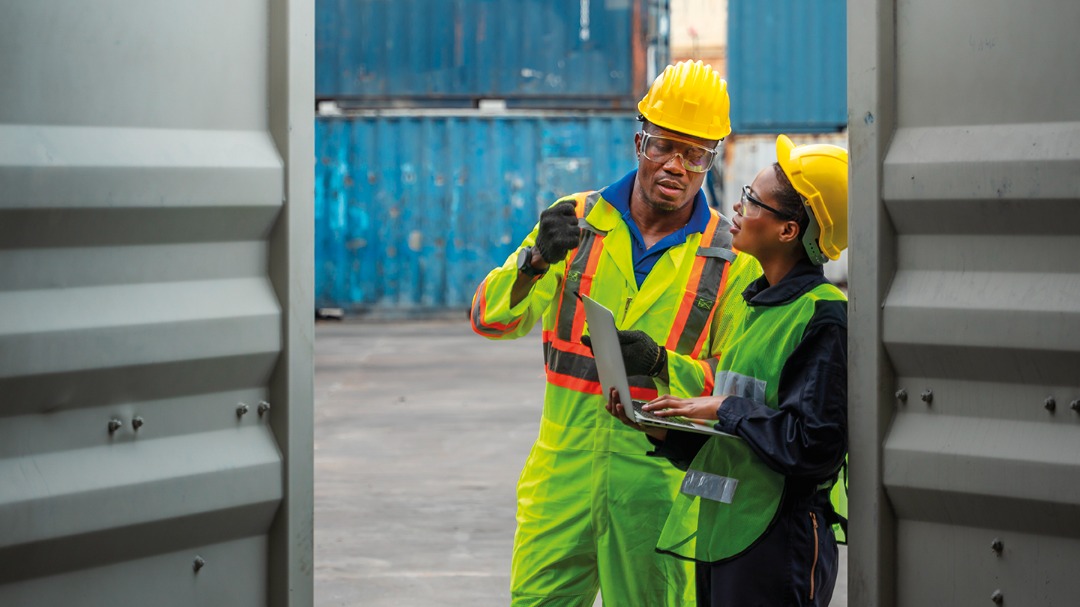
Africa Finance Corporation (AFC) Expands Asian Capital Market Footprint with US$160 Million Kimchi Loan Facility Led by Mizuho and Shinhan Bank
The successful closure of the 3-year Kimchi loan facility is a positive indication of Korea’s and more broadly Asia’s growing interest in infrastructure investment opportunities in Africa LAGOS, Nigeria, December 7, 2022/ — Africa Finance Corporation (https://www.AfricaFC.org/), the leading infrastructure solutions provider in Africa, is expanding its footprint in Asian capital markets, today announcing the successful closure of a US$160 million Kimchi Term Loan Facility with Mizuho Bank, Ltd. and Shinhan Bank as Bookrunners and Mandate Lead Arrangers (BMLAs). This facility follows the successful execution of the Corporation’s inaugural US$140 million Kimchi loan facility in 2019, its first foray into the Korean debt market. This year, AFC has made several strides in diversifying its funding sources, which include a EUR 100 million loan from the Italian Development Finance Institution-CDP, a US$100 million loan facility from the Korea Development Bank (KDB) and, most recently, a US$389 million dual currency Samurai term loan facility. These milestone transactions are a testament to AFC’s deep expertise, strong credit profile and stellar reputation in global capital markets. The successful closure of the 3-year Kimchi loan facility is a positive indication of Korea’s and more broadly Asia’s growing interest in infrastructure investment opportunities in Africa. Last year, Korea pledged US$600 million in financing under the Korea-Africa Energy Investment Framework (KAEIF), moving the country’s focus on the continent from aid to trade and investment. Nigeria, AFC’s host country, was recently declared as Korea’s largest trading partner in Africa by the Korea-Africa Foundation.
Banji Fehintola, Senior Director & Treasurer of AFC, commented: “We are pleased to have successfully executed on our second Kimchi loan facility, expanding our footprint in Korea and Asian capital markets at large. Today’s announcement serves as a validation of AFC’s strong market access, the strength of our credit profile and our well-established investor engagement programme. We continue to seek strong partnerships with credible institutions across the globe to provide capital for the urgently needed infrastructure required to sustainably transform African economies and change the lives of its people for good.”
Proceeds from the new facility will be used for refinancing and general corporate purposes in accordance with AFC’s Establishment Agreement and Charter.
Mizuho Bank has been in close partnership with AFC for some time, with both institutions signing an MOU earlier this year to collaborate on driving sustainable economic growth in Africa and Asia. Mizuho also supported AFC’s Samurai loan facility last month as a Bookrunner and Mandated Lead Arranger (BMLA) and Joint Co-ordinator. Shinhan Bank, a repeat lender on the Corporation’s Kimchi facility, has also proven to be a strong partner for AFC in executing its funding strategy.
Stewart Wakeman, Managing Director & Head of Sub Sahara Africa at Mizuho commented: “We are delighted to be involved in this landmark transaction for AFC. Our close partnership with AFC combined with Mizuho’s commitment to connect Asian investors to African markets led to the successful execution of this milestone transaction. Over & above this, we are extremely proud to have played a role in this transaction to support AFC in their role towards Africa’s development. “
Mr Sang Hyun Woo, EMEA Regional Head of Shinhan Bank, commented: “We are absolutely delighted with the result. We delivered another successful execution of AFC’s ‘Kimchi’ facility together with our partner bank, Mizuho. Shinhan Bank arranged the first ever ‘Kimchi’ syndicated facility for one of African multilateral development banks (‘MDBs’) in 2018 and subsequently, Shinhan was mandated and arranged the first ‘Kimchi’ syndicated loan for AFC in 2019. From these successful stories, we have strong appetite to grow our business in the region. Shinhan will continue to look for opportunities in Africa through enhancing relationship with AFC,”
Other participating financial institutions on the new Kimchi facility include Taipei Fubon Commercial Bank Ltd, Hua Nan Commercial Bank Ltd, Taiwan Cooperative Bank, The Export-Import Bank of the Republic of China, Industrial Bank of Korea and Kexim Bank Limited.
Media Enquiries:
Yewande Thorpe
Communications
Africa Finance Corporation
Mobile : +234 1 279 9654
Email : yewande.thorpe@africafc.orgGavin Serkin
New Markets Media & Intelligence
Telephone: +44 20 3478 9710
Email: gserkin@newmarkets.mediaAbout Africa Finance Corporation (AFC):
AFC was established in 2007 to be the catalyst for private sector-led infrastructure investment across Africa. AFC’s approach combines specialist industry expertise with a focus on financial and technical advisory, project structuring, project development and risk capital to address Africa’s infrastructure development needs and drive sustainable economic growth.Fifteen years on, AFC has developed a track record as the partner of choice in Africa for investing and delivering on instrumental, high-quality infrastructure assets that provide essential services in the core infrastructure sectors of power, natural resources, heavy industry, transport, and telecommunications. AFC has invested over US$10 billion in 36 countries across Africa since inception.
SOURCE
Africa Finance Corporation (AFC)Distributed by APO Group on behalf of Africa Finance Corporation (AFC).
-
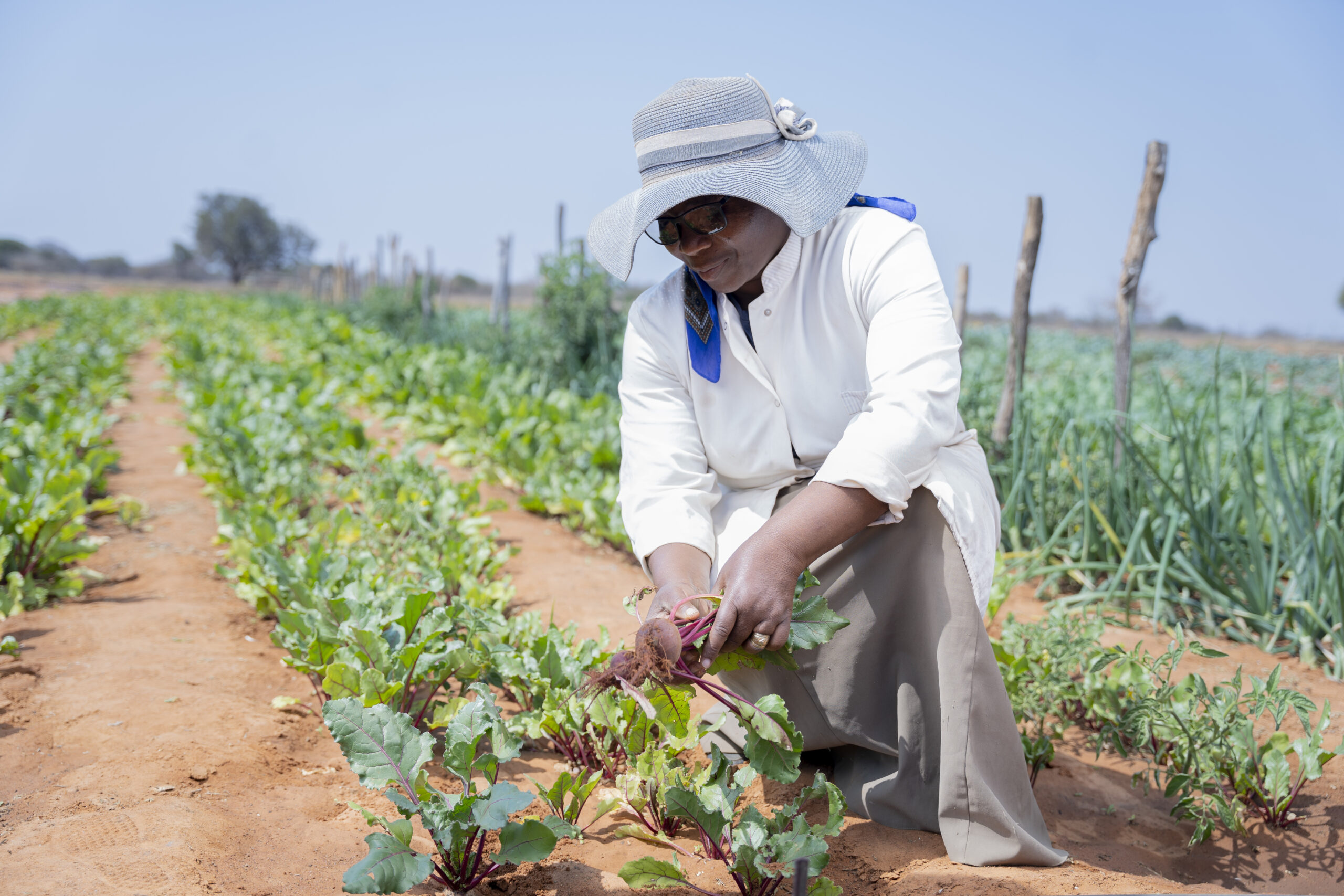
Brastorne Connects the Unconnected in Africa
Brastorne has implemented disruptive solutions to dissolve the barriers to digital inclusion in Africa GABORONE, Botswana, December 6, 2022/ — The Challenge More and more aspects of modern life have moved online. Access to information, economic opportunities, and how we interact with our social circles are all reliant on access to the internet. Access to this near-limitless online world leads to empowerment for those with ready access. However, digital inclusion is not universal and a growing digital divide is excluding entire segments of our society from the potentially limitless benefits.
This is certainly the case in Africa, where 650 million of the continent’s one billion people own mobile phones, but the majority lack meaningful digital access. There are a startling 760 million unconnected people in Africa. Economic realities are driving this digital divide. Africans use feature phones in large numbers, leaving only a few people who have both smartphones and the data plans required to be online. When they have a smartphone, digital access comes at a crippling cost. One gigabyte of mobile data costs an average of $6.44 in Africa, which is equivalent to a week’s wages for the majority of the continent’s rural poor. There are many efforts globally to promote digital inclusion, but Africa is still left behind. Brastorne acknowledges these realities and has implemented disruptive solutions to dissolve the barriers to digital inclusion in Africa.
The Solution
Brastorne is dedicated to connecting the 760 million Africans who currently lack meaningful access to the digital world. Using existing infrastructure, standard telco networks, Brastorne’s technology turns the continent’s ubiquitous feature phones into internet portals for less than $0.05 per day. For these feature phone users, Brastorne’s solutions provide an experience similar to that of a smartphone mobile app. This is accomplished through a suite of technology solutions including USSD, IVR, or Voice to promote digital inclusion through Brastorne’s applications Mpotsa, mAgri and Vuka.
Mpotsa, which translates to “ask me how?” in English, is a two-way telephone-based question/answer platform that aims to provide users with information on almost anything. It provides information to users by acting as a Google-like service that uses the user-friendly technology of Voice/IVR. Farmers use mAgri to access advisory services, wikipedia, weather/pest alerts, crop prices, and financial services, as well as trade, chat, and email in their native language. Vuka facilitates and accelerates convenient communication through USSD, allowing users to chat, send in-person messages, or broadcast messages on both low-end phones and smartphones. These solutions empower numerous communities that rely on feature phones by giving them access to essential information such as employment opportunities, health advice, and legal services.
The Impact
Brastorne has brought the power of the internet to millions of people, improving their lives. Through Brastorne’s flagship product Smallholder Farmers experience increased access to communications and Women Smallholder Farmers see increased Crop Yield and increased revenue. In 2021, 36 000 farmers gained access to information, markets, & communication in Botswana through mAgri. Furthermore Brastorne users realized 85% Monthly Savings in costs of information and communication access compared to alternatives (data bundles, physical travel costs etc), which can cost $15+/month. Brastorne users in total have realized $3.4 million total annual savings across all 60,000 subscribers in 2021. These savings can now be put to use to improve their farm, feed their families, or buy much-needed personal items.
Brastorne’s information access service Mpotsa has brought the power of the internet to new users, giving them increased access to information, medical treatment, COVID vaccinations, and access to jobs. The service is a literal lifeline with an estimated 60% of Mpotsa subscribers who cannot otherwise afford digital information. In 2021, Mpotsa connected 25,231 total youth, over 15,000 of whom would otherwise have remained unconnected. This resulted in $60,554 total information access cost savings.
The Future
With its mission of connecting 760 million Africans who lack meaningful access to today’s digital world, Brastorne plans to expand its solutions to 19 different African countries. Brastorne is currently operational in Botswana, the Democratic Republic of the Congo, and most recently Cameroon (https://bit.ly/3VBXhNM), having launched in October through partnerships with mobile network providers such as Orange. It plans to address the realities of Africa’s lack of connectivity by enabling digital inclusion and its dividends through mAgri and Vuka. Visit their website to learn more www.Brastorne.com
Distributed by APO Group on behalf of Brastorne.
SOURCE
Brastorne -
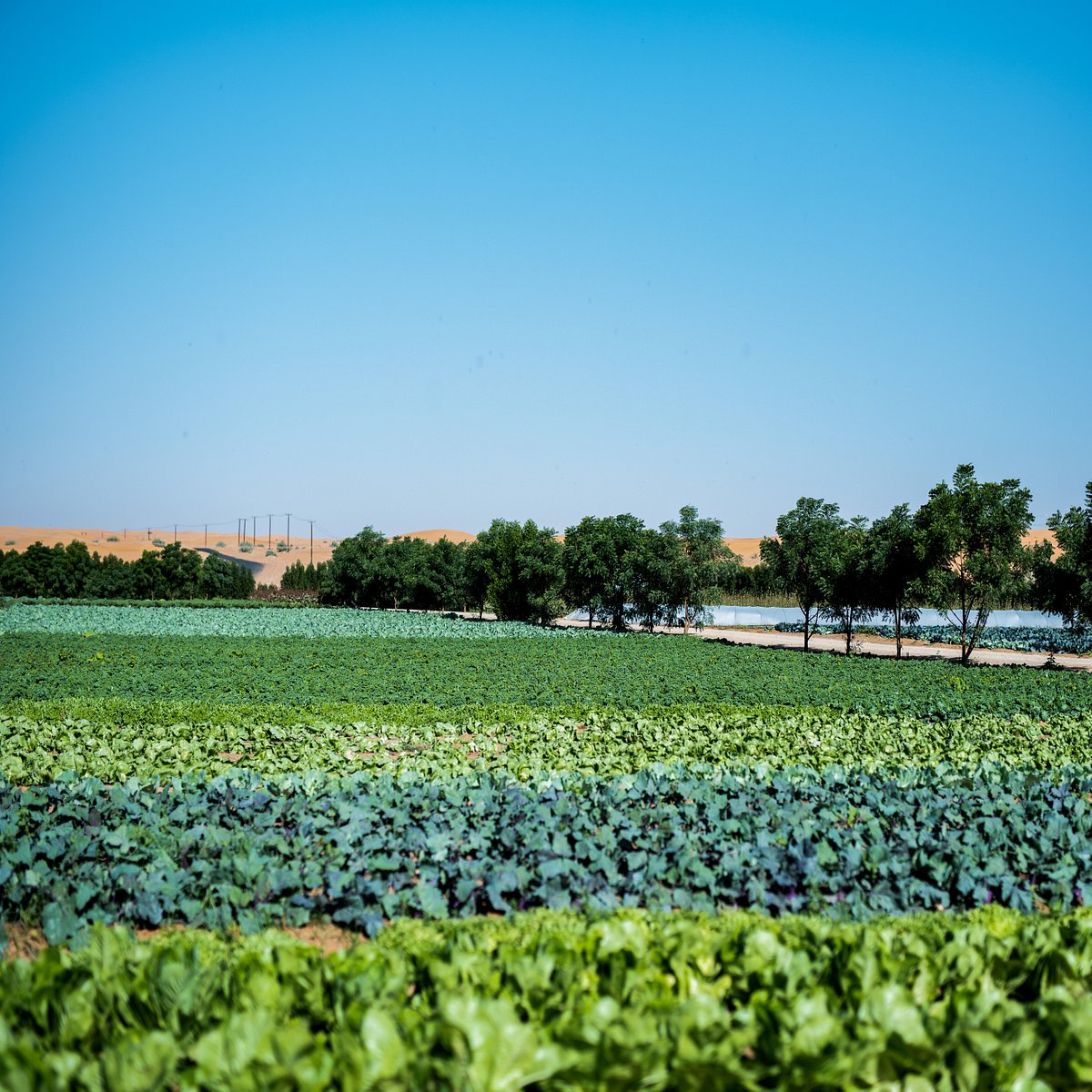
Greening the Desert through Organic Farming
Upholding the legacy of UAE’s Founder,
Emirates Bio Farm Leads the Charge
By: Mohammed Abu
The good memoirs of late UAE’s Founder, H.R.H. Sheikh Zayed Al Nahayan, shall forever be cherished. Aside the historic Economic Diversification Plan that also ensured escapade from the resource curse, his passion and initiative for greening the country’s desert, protection and conservation of biodiversity in its ecosystem also deserves spectacular mention.
To this end, the establishment of the Emirates Bio Farm(EBF), the largest organic farm in the UAE in 2016, built on the company’s founding principles of advocating for environmental protection, health and well-being of all UAE residents, was indeed one of the most glowing tributes ever paid to the Founder of the nation.
“A guiding principle which embrace from the teachings of Sheikh Zayed Al Nahyan, the founding father of the UAE and an early champion of environmental protection” EBF eulogizes him.
The mission of EBF is contributing to the establishment of a secure and sustainable food system that promotes healthy living and the protection of the environment while providing genuine, certified organic food to the market.
EBF is relentlessly working towards protecting biodiversity and the environment through its organic farming practices, building and preserving arable soil which successfully produces over 60 varieties of products in the middle of the desert in Al Shuwaib, Al Ain.
EBF uses sustainable methods such as crop rotation, companion planting and the use of natural pest repellents allows the company to grow chemical-free crops that offer a high-quality alternative to imported produce giving consumers a local and sustainable option that is healthier and better for the environment. All our organic products are handpicked where the items are getting from harvest to the market within 24 hours, in order to maintain product freshness and optimum nutrition level.
A big part of the Emirates Bio Farm mission is not only to produce high quality organic local products of many varieties but to also educate the UAE population on how their food choices impact the environment. It has also chosen agri-tourism as our method of communicating our mission and educating people about the realities of food and the impact of our choices on the environment around us.
EBF operate to increase overall output as an integrated farm; making organic food affordable and available to the local market driving it as a sustainable investment in the country’s future in order to reduce reliance on imported products.
Granted the prime importance of the seeds in the primary production value chain, EBF is also growing a seed library where seeds are collected to be re-used; as that increases the seed independence of the company and others in the region.
The EBF: Agro-tourist Destination of Choice
For foreign UAE bound tourists, conference and other events attendees as well as UAE resident holiday makers who love nature, a weekend retreat to Emirates Bio Farm, Al-Shuwaib, Al Ain, guarantees an unforgettable real life experience.
The welcoming ambiance of the serene desert environment and the organic farm ecosystem that also treats one to rich organic dishes served at the canteen produced from farm fresh vegetables, is worth experiencing.
-
Addressing Africa’s Infrastructure Funding gaps
Nigeria Returns to the Market with N100 billion Sukuk Offer
By: Mohammed Abu
Abdul Aziz Adewuyi Abdul Rahman of the Universiti Utra of Malaysia,in his abstract of his paper titled,” Sub-Sahara’s Infrastructure Funding Gap: Potentials from Sukuk Financing” notes that,Sub-Sahara African (SSA) region as a large part of the African continent suffers huge infrastructure deficit mainly as a result of the vast funding gap.
The negative impact of the infrastructure deficiency continues to constrain socioeconomic development and the general well-being of the people of the region.
Heavy reliance on the traditional sources of funding by many of the countries in the region, he intimates, has failed to meet ever-growing demands for infrastructural development of the region. Potentials presented by Islamic finance are yet to be exploited by a large number of countries in the region.
The study evaluates the depth of utilization of Islamic capital market using Sukuk instruments as another source of funding to fill the observed funding gap for infrastructure development.
The study finds that the use of Sukuk as a long-term financing instrument is still at its infancy stage in the region. The paper, therefore, suggests that the SSA countries can undertake rapid and massive infrastructure developments in the region through the use of Sukuk instruments, thereby eliminating increasing sovereign debt overhang from the conventional debt market.
The study also recommends that policy makers in the region put in place required laws and regulations that will provide enabling environments for effective utilization of Sukuk instruments for infrastructural development.
Similarly, strong political will on the part of the region’s political leaders is essential in nurturing strong institutions that can engender policy continuity to ensure effective and efficient management of infrastructure projects funded by Sukuk instruments.
It is therefore against this background that, the recent return of the Federal Government of Nigeria to the sukuk market to raise more funds for financing infrastructure could be best appreciated
The Nigerian Federal government’s Debt Management Office (DMO) recently formally announced the opening of an offering for a 10-year N100 billion(USD225.62m) Forward Ijarah (Lease) Sukuk instrument at a rental rate of 15.64 percent per annum, payable half-yearly.
The offer which opened on November 21 was due for closure on November 29, while the settlement date is also due on December 2, 2022..
The offer at N1,000 per unit, an official statement said, is subject to a minimum subscription of N10,000 and in multiples of N1,000 thereafter.
.
The Sukuk is a strategic initiative that supports infrastructure development, promotes financial inclusion and deepens the domestic securities market.According to the statement, the instrument was issued by FG Roads Sukuk Companies 1 Plc on behalf of the federal government.
The DMO said that the proceeds from the offer would be used solely for the construction and rehabilitation of key road projects across the six geopolitical zones.
The offer which opened on November 21 was due for closure on November 29, with the settlement date due December 2, 2022.
“It qualifies as securities in which trustees can invest under the Trustee Investment Act,” the statement reads.
“It also qualifies as Government securities within the meaning of Company Income Tax Act (CITA) and Personal Income Tax Act (PITA) for Tax Exemption for Pension Funds, among other investors.”
According to DMO, the Sukuk instrument is to be listed on the Nigerian Exchange Limited and FMDQ Securities Exchange Limited.
“Classified as Liquid Asset by the Central Bank of Nigeria, and certified by the Financial Regulatory Advisory Council of Experts (FRACE) of the Central Bank of Nigeria,” DMO said
Since the establishment of the initiative in September 2017, Nigeria has issued four Sovereign Sukuk — 2017 (N100 billion), 2018 (N100 billion), 2020 (N162.557 billion) and 2021 (N250 billion).Islamic Capital Markets sources say, the Ijarah Sukuk, which was first issued in Nigeria in 2017, is a domestic component of government borrowings and has given the Federal Government NGN 612,557 billion (USD 1388) to fund 71 roads and six bridges totaling 1,881 kilometres across the country.